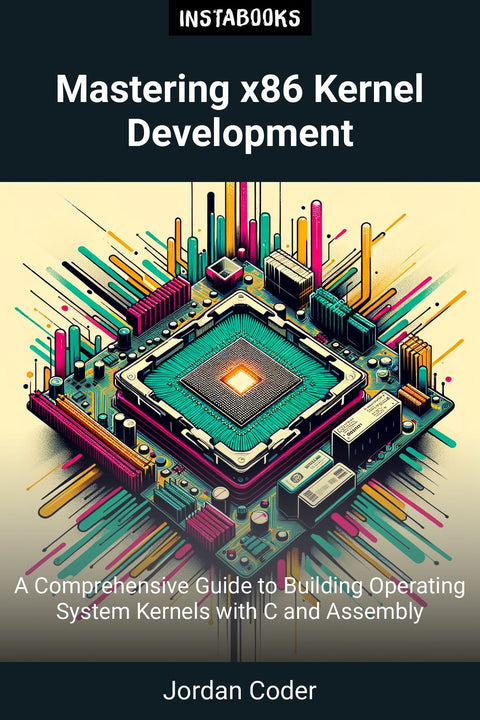
Mastering x86 Kernel Development
A Comprehensive Guide to Building Operating System Kernels with C and Assembly
Included:
✓ 200+ Page AI-Generated Book
✓ ePub eBook File — read on Kindle & Apple Books
✓ PDF Print File (Easy Printing)
✓ Word DOCX File (Easy Editing)
✓ Hi-Res Print-Ready Book Cover (No Logo Watermark)
✓ Full Commercial Use Rights — keep 100% of royalties
✓ Publish under your own Author Name
✓ Sell on Amazon KDP, IngramSpark, Lulu, Blurb & Gumroad to millions of readers worldwide
Unlock the Secrets of x86 Kernel Development
This book delves deep into the fascinating world of kernel development, focusing on the x86 architecture using C and Assembly. Whether you are a novice or a seasoned programmer, this guide will take you on a journey through the intricate boot process, memory management, and hardware interactions, equipping you with the knowledge and practical skills needed to create your own operating system.
The Boot Process & Partitioning Hard Drives
We begin by demystifying the boot process, elucidating how and where your code starts. Learn about partitioning a hard drive with complete control over the media. With practical C source code examples, you'll gain insight into the technical intricacies that make kernel booting possible.
Hardware Support: Legacy to Modern
This guide covers both legacy hardware interaction, including RTC, PIT, and PIC, as well as newer hardware elements like APIC, ACPI, and HPET. Understanding these systems is crucial for any kernel developer aiming for compatibility and performance.
Memory Management & Multi-processing
Explore essential concepts in tasking, threading, and memory paging, along with strategies for detecting available memory. With comprehensive examples and explanations, you will learn how to manage resources effectively within your kernel.
Advanced Topics & Practical Code Examples
As you advance, delve into UEFI BIOS booting, virtual filesystems, and graphical user interface design. This book not only teaches you the theory behind these concepts but also provides practical code snippets to help you implement your learning.
Your Path to Becoming a Kernel Developer
With a detailed table of contents and thorough explanations throughout, this book is an invaluable resource for anyone interested in kernel development. Get ready to transform your understanding and skills in x86 programming!
Table of Contents
1. Introduction to x86 Kernel Development- Understanding Kernel Development
- The Importance of x86 Architecture
- Overview of the Book's Structure
2. The Boot Process Unveiled
- How and Where Your Code Starts
- Roles of Bootloaders and Kernels
- Practical Examples of Boot Process
3. Managing Hard Drive Partitions
- Partitioning Techniques and Tools
- Accessing and Controlling Media
- Sample Code for Hard Drive Management
4. Memory and Resource Management
- Detecting Available Memory
- Memory Paging Mechanisms
- Practical Memory Management Examples
5. Legacy Hardware in Kernel Development
- Interfacing with RTC, PIT, and PIC
- Understanding Legacy Support Requirements
- Sample Code for Legacy Interaction
6. Working with Modern Hardware
- APIC and ACPI Explained
- Integrating HPET into Your Kernel
- Modern Hardware Considerations
7. Multi-Processor Systems
- Detecting Multiprocessor Configurations
- Managing Threads Across Cores
- Practical Multi-Processing Example
8. Exploring UEFI BIOS
- Introduction to UEFI vs Traditional BIOS
- Booting with UEFI: Key Differences
- Sample Code for UEFI Booting
9. Building Virtual Filesystems
- Design Considerations for Filesystems
- Implementing Virtual Filesystems in Code
- Sample File Management Operations
10. Graphical User Interfaces for Kernels
- Basics of GUI Design in Kernels
- Graphical Programming with C and Assembly
- Examples of GUI Implementations
11. Driver Development Essentials
- Understanding USB and PCI Drivers
- Developing Effective Drivers
- Code Examples for Driver Development
12. Advanced Topics in Kernel Development
- Deep Dive into ACPI and APIC
- Exploring Performance Tuning Techniques
- Future Trends in Kernel Development
Target Audience
This book is intended for computer science students, software engineers, and enthusiasts who want to learn kernel development using x86 architecture, particularly those with a foundational understanding of C and Assembly programming.
Key Takeaways
- Understanding the complete boot process for x86 systems.
- Practical techniques for managing hardware resources and memory.
- Insights into developing drivers for USB and PCI devices.
- Knowledge of both legacy and modern hardware support mechanisms.
- Hands-on experience with kernel programming through practical code examples.
